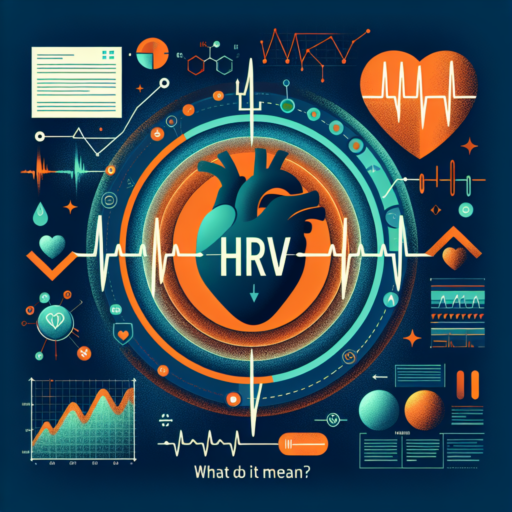What is a good HRV when sleeping?
Understanding what constitutes a good Heart Rate Variability (HRV) during sleep is essential in gauging one’s overall wellness and sleep quality. HRV refers to the variance in time intervals between heartbeats, and it can be a crucial indicator of your autonomic nervous system’s flexibility and health. Generally, a higher HRV signifies better physical fitness, stress resilience, and recovery capabilities.
Optimal HRV Ranges
The optimal HRV range when sleeping can vary significantly from person to person, influenced by factors such as age, fitness level, and overall health. On average, an HRV score between 40-100 milliseconds (ms) is considered healthy for most adults, highlighting a strong variability and hence, a well-functioning autonomic nervous system. However, it’s crucial to monitor your personal baseline and track any deviations from it.
Improving Your HRV
To enhance your HRV, focusing on lifestyle choices that bolster your heart’s health and reduce stress is essential. Regular physical activity, mindful meditation, and maintaining a consistent sleep schedule can contribute significantly to improving your HRV scores over time. Adopting a balanced diet rich in antioxidants, omega-3 fatty acids, and minimal in processed foods can also aid in fostering a better HRV during sleep.
It’s important to recognize that while tracking your HRV can provide insightful data about your health and recovery status, it should ideally be viewed as part of a broader wellness strategy. Consulting with a healthcare professional can help interpret your HRV readings in the context of your personal health situation and guide you towards more targeted interventions if necessary.
No se han encontrado productos.
What is a good HRV for my age?
Understanding Heart Rate Variability (HRV) as a measure of your heart’s ability to adapt can provide significant insights into your overall well-being, especially when evaluated in accordance with your age. A good HRV typically suggests a healthier, more resilient heart, but what constitutes a «good» HRV can significantly vary from one individual to another, largely due to age-related differences.
For individuals in their 20s to 30s, an average HRV might range from 55 to 105 milliseconds, reflecting the higher resilience and adaptability of younger hearts. As age progresses, expected norms for HRV tend to decrease, with individuals in their 50s and above often presenting an HRV range from 25 to 45 milliseconds. It’s crucial to consider that these numbers are averages and that a «good» HRV can look different based on individual health status, lifestyle, and genetic factors.
To accurately assess what a good HRV is for your age, it’s recommended to use a personalized approach, taking into account not only age-specific norms but also personal health history and lifestyle factors. Utilizing wearable technology or specialized medical equipment to track your HRV over time can offer deeper insights, enabling a more tailored assessment of what constitutes a good HRV benchmark for you individually.
Should I worry if my HRV is low?
Understanding your Heart Rate Variability (HRV) is pivotal in assessing your overall health and fitness levels. However, encountering a low HRV can prompt concerns about what it reflects about your bodily functions. It’s paramount to grasp the significance of HRV and its role as an indicator of your autonomic nervous system’s balance between its sympathetic and parasympathetic branches.
Factors Influencing Low HRV
Numerous factors can contribute to a lowered HRV, including stress levels, poor sleep quality, lack of physical activity, or even chronic health issues. Identifying and addressing these underlying causes can be a critical step in improving your HRV and, by extension, your overall well-being.
Immediate Steps to Improve HRV
If you’re concerned about your low HRV, consider implementing lifestyle changes aimed at enhancing your HRV. Methods such as engaging in regular exercise, prioritizing quality sleep, and practicing stress-reduction techniques can have a sizable impact. Also, keeping hydrated and maintaining a balanced diet rich in omega-3 fatty acids are practical steps towards better heart health and improved HRV.
It’s essential to remember that while a low HRV can be a cause for concern, it also serves as a valuable opportunity to reassess your lifestyle choices. Monitoring your HRV over time, in conjunction with professional medical advice, can help you make informed decisions about interventions that may enhance your health and quality of life.
Is 30ms a good heart rate variability?
Understanding heart rate variability (HRV) is crucial in assessing overall cardiovascular health and fitness levels. HRV refers to the variation in time between successive heartbeats and is a reflection of the autonomic nervous system’s ability to adapt and respond to stress, recovery, and environmental changes. When considering whether a 30ms heart rate variability is good, it’s essential to consider individual health circumstances and fitness levels.
HRV is highly individual. A HRV of 30ms can be perceived differently depending on several factors such as age, gender, and physical fitness. For athletes or individuals with high physical conditioning, a 30ms HRV might indicate a need for more rest or a reassessment of training intensity. In contrast, for someone less active or at the beginning of their fitness journey, 30ms could signify an acceptable level of stress and adaptation.
Factors Influencing HRV
- Age: As people age, HRV typically decreases. Younger individuals tend to have higher HRV.
- Physical Fitness: Regular, moderate exercise can improve HRV over time.
- Lifestyle Habits: Stress, sleep quality, and nutrition all play a significant role in affecting HRV.
It’s also important to note that HRV is a variable measure, and consistency in tracking over time can provide more insight than a single measurement. While a 30ms HRV might be a starting point for understanding one’s heart health, comprehensive health assessments and consistent monitoring are key to determining its significance in the context of overall wellness and fitness goals.




